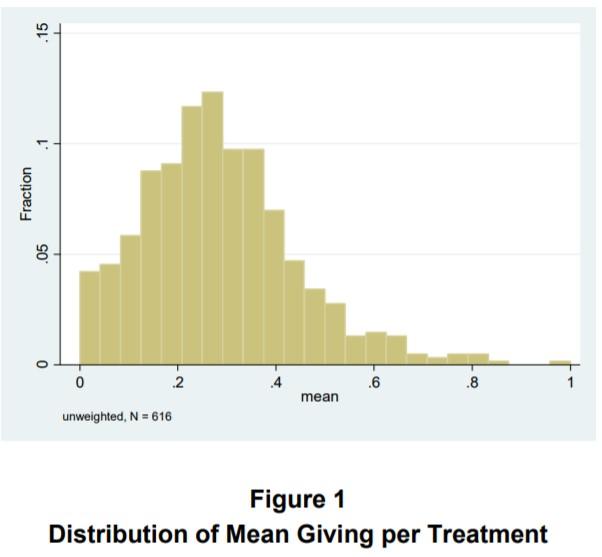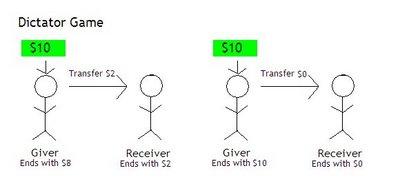Introduction
One of the classical assumptions of behavioral economics is that people act with self-interest in mind. In situations related to financial well-being, personal interests and desires will inherently come first. This is an evolutionary survival technique that applies to modern society as well.
Although the concept of altruism is promoted as a social and behavioral trait, it assumes that a rational human always makes decisions to maximize benefits to themselves in one way or another. Therefore, in economic theory, it is essential to evaluate the rationale and motive of financial behavior in order to determine whether assumptions are correlated with reality within an experimental setting. This paper presents an experiment based on the “dictator game” that investigates the behavior of individuals presented with an opportunity to choose between self-interest and altruism.
Literature Review
The dictator game is a type of bargaining game that attempts to manipulate strategic behavior. It is meant to study the impact of fairness, trust, or altruism in economic decision-making. One of the players selected to be the “dictator” selects the optimal strategy depending on the move of another player and in turn putting pressure on them (“Dictator Game”).

Experimental economics has focused on exploring social behavior. A dictator game makes it possible to reveal potential social motives that drive decision-making in situations of financial inequality and authority. A variety of theoretical models exist to support ideological predispositions for human behavior. Fairness and equity models argue that people are interested in more than absolute self-interest but also relative payoffs as well. Another model suggests that payoffs are based on social preference and efficiency. It has been suggested that reciprocity is a factor which can drive a player’s intention. A popular model focuses on altruism by establishing utility functions for distribution of wealth. However, all models assume that the dynamic of social behavior remains stable and identical over time and repetitions. A dictator game is helpful to observe social behavior with various strategic considerations excluded. It is effective since payoff outcomes can be determined without calculation and there is no interdependence of decisions (Brosig-Koch et al. 2).
A meta-analysis of studies conducting dictator games shows that on average, 28.35% of the endowment is given away by the dictator. A random-effects meta-analysis shows equivalent results. Figure 1 above shows the distribution of the results out of 616 treatments, with the distribution being skewed to the left. In 6 of these, the average remained zero. The distribution of the contributions is uneven, with 36.11% keeping everything, 16.74% splitting evenly, and 5.44% giving away the whole amount. This disproves the null hypothesis observed in most studies and based on the rational choice theory that the give rate will be 0 (Engel 7). It was found that specific manipulating factors had profound effects on the rate of distribution. These include incentives, social control, and social distance. For example, revealed identity or use of real money showed unique effects. Furthermore, demographic data such as age, gender, and even country of birth led to specific patterns of behavior (Engel 25).
Experiment Design and Procedures
Design

The diagram above illustrates the basic design concept of the dictator game. The player chosen to be the dictator is provided with a set endowment that must be allocated amongst the players. The giver must offer a set amount to the other player, even if it is equal to 0. The dictator’s decision is final. Meanwhile, the other player has no impact on the strategic outcome. Therefore, the experiment is meant to isolate a subject’s decision under the condition of no reciprocal consideration from the opposing player. “A typical distribution of offers with an initial endowment, e, is bimodal at the predicted offer (e, 0) and the equitable offer (0.5e, 0.5e), where the first element indicates the dictator’s payoff and the second the receiver’s” (Schurter and Wilson 130).
There are a number of influencing factors that can impact the decision made by the dictator. Certain barriers can be established by the experimenter such as a trivia quiz to determine the dictator (earning authority) or changing endowment size in different trials. However, the most significant factor is social distance. The condition of anonymity or communication amongst the players could impact the decision since the dictator would feel social judgment and concerns of fairness if identities were to be revealed (Schurter and Wilson 130). This experiment would attempt to eliminate any potentially influential social factors in order to isolate the specific economic behavior of individuals.
Hypothesis
Under the conditions of anonymity and lack of influencing social factors, subjects selected as dictator will choose to offer ~20% of the money to the other player in the majority of the trials.
Procedures
The experiment will be conducted in a class. It does not require prerequisite knowledge or preparation from the subjects. The experiment should take approximately 15 minutes. Each student is assigned a number which is then randomized by a computer program to determine dictators and receivers. This ensures anonymity since students will be familiar with each other. To encourage truthful participation, it is announced that several random participants will receive monetary payouts.
Dictators are provided with a form (either paper or computerized) that allows them to record their decision of how much to offer the other player out of a $10 value. The forms are collected and mixed. They are then given to the receivers, randomly matched by number. The recipients cannot accept or reject the offer, but must simply fill out how much they have been offered. To collect qualitative data, it may be helpful to include a section for both the dictator and the recipient to indicate their justifications or feelings based on the values. The students then switch roles and repeat the procedure for a second trial.
Interpretation
It is both difficult and inaccurate to generalize experimental results as applicable in a real-world setting. Theoretical frameworks have to account for psychological and economic realities, and the settings of interpersonal and financial interaction. However, the dictator game creates a situation similar to that of a credible, authoritative figure inquiring whether to share money with their less fortunate dependents. In a real-world setting, it is common to find this type of pairing, which makes certain people’s well-being dependent on others, either professionally or politically. There are specific socio-cultural norms that impact human behavior in these cases. However, interpreting experimental results with reference to real-life settings should be done with caution since artificial conditions impose limits and do not account for true moral pressures that could influence behavior. One beneficial use of a simple dictator game is to determine how economic behavior is elicited by institutionalized manipulation (List 491). This aspect is highly applicable to corporations and governments in a real-world setting.
Works Cited
Brosig-Koch, Jeannette, et al. “The Dynamics of Behavior in Modified Dictator Games.” PLoS ONE, vol. 12, no. 4, 2017, pp. 1-18. Web.
“Dictator Game.” EconPort, n.d. Web.
Engel, Christoph. Dictator Games: A Meta Study. 2010. Web.
List, John A. “Justice and Fairness in the Dictator Game.” Journal of Political Economy, vol. 115, no. 3, 2007, pp. 482-493. Web.
Schurter, Karl, and Bart Wilson. “Justice and Fairness in the Dictator Game.” Southern Economic Journal, vol. 76, no. 1, 2009, pp. 130-145. Web.